The Olympic Games are the most important sporting event worldwide. From Ancient Greece to the present day, in this edition marking the end of the XXXIII Olympiad, athletes from around the world compete to win a medal that only a few, the best, will have the honor of achieving. It is not surprising that all countries and continents also strive to host, at least once, an event of such magnitude.
But for the show to run smoothly, organization is a fundamental element, and the figures left behind by that organization speak of the brutal magnitude of the event. It is an opportunity for each city to showcase its capacity, facilities, or amenities. Everything is important. From the torch relay that will light the cauldron to the last light that goes out in the Olympic Village where the majority of the 10,500 athletes (from 206 National Olympic Committees) who are traveling to Paris these days will reside.
On their shoulders will rest the weight of the billions of people worldwide, who through the 350,000 hours of planned TV broadcasting, will be able to follow each competition moment by moment. And for their performance to be the best possible, the more than 600,000 meals served in the Village during the competition days will be crucial.
Over the course of a few days, a total of 329 events will be contested, commented on, narrated, and analyzed by approximately 20,000 accredited journalists in the French capital. They will move around the 35 iconic venues that the city has prepared as the stages for the various disciplines (for example, beach volleyball will have the wonderful Eiffel Tower as its backdrop).
Yes, there will be a new sport. Breaking, which will have its first medal event on August 9th and will attract the younger audience looking for something new and different. In the Tokyo Games, the IOC decided to introduce three new disciplines that will be repeated this year: sport climbing, where Alberto Ginés won the gold medal, skateboarding, and surfing, where Spain will have a male representative for the first time: Andy Criere. Karate, a sport that has been sacrificed, will not be included.
Additionally, new modalities within already established sports will be showcased: mixed event in athletics (race walking), a new weight category in women's boxing, the introduction of extreme slalom in canoeing, kitesurfing, along with oceanic regattas in sailing. Together, they make a total of 32 different sports and 754 sessions (including competitions and ceremonies).
Six sports without representation
The Spanish Olympic Committee (COE) has confirmed a total of 382 athletes qualified for these Games (the highest number since Barcelona'92) who will compete to add medals to the tally. However, not all sports will have Spanish representation. Breaking, wrestling (neither Greco-Roman nor freestyle), rugby, weightlifting, BMX cycling, and volleyball will not have any Spanish athletes. This significant reduction is something Spain hopes not to feel too much in order to surpass the 17 medals achieved in Tokyo, which placed our country in the 22nd position in a ranking led by the United States with 113.
